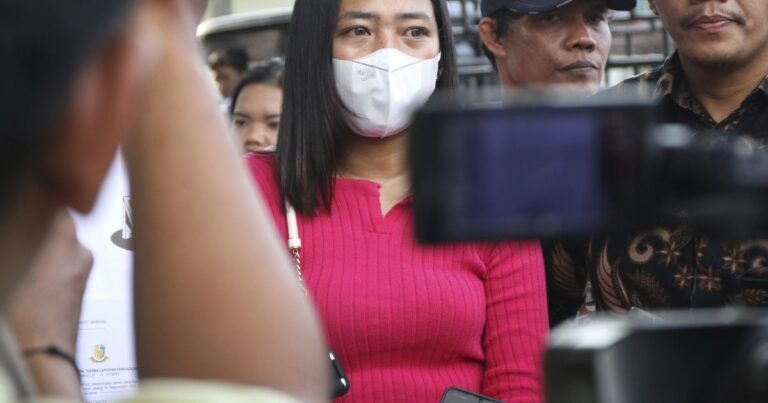(Jakarta) – Indonesian police and military should investigate the deadly arson attack on a journalist and three of his family members in the small town of Kabanjaje in North Sumatra, Human Rights Watch said today. Three people have been arrested, but authorities should also question other suspected accomplices.
Rico Sempurna Pasaribu, 47, of Medan-based Trivata TV, and his family were found dead in their small wooden house in Kabanjahe on 27 June 2024. The deceased included his wife, Elparida Ginting, 48, their daughter, Sudi Investi Pasaribu, 12, and their three-year-old grandson, Luin Arlando Situnkir, who the Pasaribu family was babysitting that night. His eldest daughter, Eva Meliani Pasaribu, 22, who lost her young son in the fire, is now campaigning for justice.
“Indonesian police should conduct a credible, time-bound investigation to identify all those involved in the attacks, including military personnel,” said Meenakshi Ganguly, deputy Asia director at Human Rights Watch. “The military should work with police to ensure that military personnel involved in gambling and arson are appropriately prosecuted.”
On June 22, Tribata TV published a Pasaribu article on its website titled, “Gambling den on Captain Bonginting Street found to belong to a corporal-rank officer attached to the 125th Army Battalion.” The article showed photos of a house that was said to be the office of an illegal online gambling business, located near the barracks of the 125th Army Battalion in Kabanjaje.
The article was unsigned, but Pasaribu posted a link to it on his Facebook page and said the gambling was controlled by an army officer he named.
The Medan Journalists’ Safety Committee, which published the initial report on the arson incident, said soldiers allegedly threatened Pasaribu after the report was released and that they also asked Tribata TV editor-in-chief Edrin Adriansyah to remove the report, but both refused, according to Adriansyah and the committee.
The Committee for Journalist Safety is a coalition of groups including the Union of Independent Journalists and the Medan Legal Aid Society in Medan, the capital of North Sumatra province. Pasaribu said several fellow journalists reported being threatened by soldiers, and that he decided to stay away from home for several days out of fear of being attacked, the committee said.
Bayu Wardana, secretary-general of the Union of Independent Journalists, said he feared a cover-up. “This case deserves special attention because of the suspected involvement of the military,” Wardana said. “Just before his death, Rico had been reporting on an online gambling operation that was allegedly supported by military personnel.”
A military spokesman said authorities had questioned the soldiers named in the report and found they had no involvement in gambling. The Indonesian military has a long history of protecting soldiers from prosecution for human rights violations, Human Rights Watch said.
In Kabanjaje, the capital of Karo Regency, gambling is a widespread social problem. On June 26, religious groups protested in front of the 125th Battalion headquarters, demanding an end to gambling operations.
Pasaribu turned up to cover the protests, published a report on the Trivata TV website and posted photos on his Facebook page, before returning home.
The attack took place at 3.40am on June 27, according to security camera footage. North Sumatra police arrested three suspects, Yunus Saputra Tarigan (also known as Serewang), Rudy Apli Sembilin and Bebas Ginting. The wooden house, which was part of a shop where Pasaribu’s wife sold snacks, cigarettes and kerosene, burned quickly, police and the commission said.
Police said they had interviewed 28 witnesses. Among those arrested was 62-year-old Ginting. The Union of Indonesian Youth Liberation Movement (AMPI) is a youth wing linked to Golkar, one of Indonesia’s largest political parties, and had official ties to the Indonesian military during President Suharto’s three decades in power.
Indonesian authorities have failed to arrest suspects in the murders of journalists over the past three decades, including Fuad Muhammad Syafruddin, who was killed in 1996 after publishing several reports about corruption in Bantul regency in the months before his death.
In 1999, Sander Toenes, a Dutch journalist working for the Financial Times, was murdered by soldiers from the Indonesian Army’s 745th Battalion in Bekora, a suburb of Dili, East Timor. The case was eventually dropped after the battalion commander, Major Jacob Joko Sarrosa, who was indicted by the Indonesian Human Rights Commission over the murder, failed to appear before a summons.
“The brutal murder of Sempurna Pasaribu and her family should serve as a warning to Indonesian authorities that political protection emboldens criminals to punish journalists and whistleblowers,” Ganguly said. “Soldiers involved in corruption, extortion, threats and murder should know that they have no place in the military and deserve to be behind bars.”


